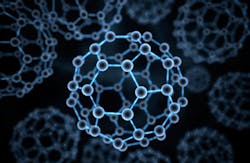Treated buckyballs can separate metals from water, researchers discover
Carbon-60 fullerenes, also known as buckyballs, can be used to remove metals from water, according to a new study at Rice University.
Researchers in the Rice lab of chemist Andrew Barron discovered that treated carbon-60 molecules can separate valuable but potentially toxic metal particles from water and other liquids, and reserve them for future use.
The study, led by Rice undergraduate Jessica Heimann, has been published in the Royal Society of Chemistry journal Dalton Transactions.
Barron said that buckyballs which have gone through the chemical process known as hydroxylation aggregate into pearl-like strings as they bind to and separate metals from solutions. Potential uses of this process include the environmentally friendly removal of metals from acid mining drainage fluids, a waste product of the coal industry, as well as from fluids used for hydraulic fracturing in oil and gas production, Rice University said.
Experiments revealed that fullerenols combined with a dozen metals, turning them into solid cross-linked polymers. Most effective was zinc, followed by cobalt, manganese, nickel, lanthanum, neodymium, cadmium, copper, silver, calcium, iron and aluminum.
There were good reasons for choosing these metals for testing, Barron explained. For example, aluminum, zinc and nickel are found with iron in acid mining drainage water. Cadmium was tested for its association with fertilizer and sewage sludge, and copper with mining discharge. Nickel, lanthanum and neodymium are used in batteries and drive motors in hybrid vehicles.
